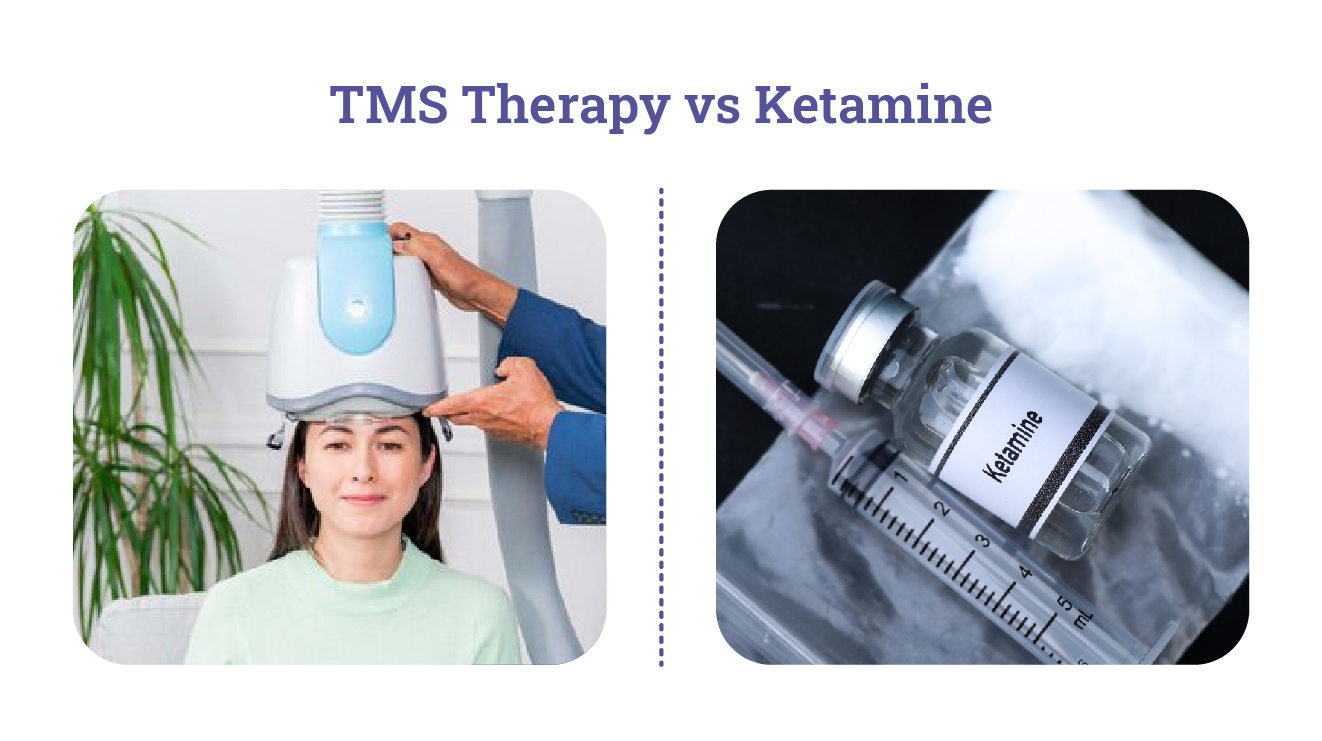What do you think of this article?
By Dr. David Woo - September 25, 2023

The field of mental health treatment is always evolving and adopting innovative treatments based on emerging research and evidence. In this article, we will compare two therapies that are gaining in popularity as alternative treatments for depression and other mood disorders: ketamine and TMS.
TMS VS Ketamine: A Side-By-Side Comparison
TMS and ketamine are very distinct forms of therapy, even if they can be used to treat the same conditions. Both options are increasingly popular alternative therapies for treatment-resistant depression, i.e., in cases where talk therapy or antidepressants have failed to satisfactorily alleviate a patient’s symptoms.
How Do They Work?
Ketamine
Ketamine was originally developed as an anesthetic and gained notoriety as a recreational substance. However, it has been recognized by the medical establishment as a rapid-acting antidepressant and anxiolytic (anti-anxiety) agent (1). This is because the drug targets the brain’s glutamate receptors, promoting synaptic plasticity, which enhances the formation of new neural connections to regulate brain activity. Ketamine is typically applied in a controlled clinical setting in the form of an intravenous (IV) drip or as a nasal spray (esketamine).
TMS
Transcranial Magnetic Stimulation (TMS) is a noninvasive procedure that uses a helmet-like device to deliver tiny, barely perceptible electromagnetic fields through the scalp in order to stimulate specific brain areas associated with the patient’s symptoms. By modulating the brain’s natural electrochemistry, it promotes neuroplasticity and new connections in the targeted brain area and has been shown to be effective in relieving symptoms of depression (2).
How Long Is Each Treatment?
One of the most significant advantages of ketamine is its rapid onset time. Many patients experience relief from depressive symptoms within hours or days, compared to the weeks typically required for traditional antidepressant medications. Typical ketamine treatment involves an application of the nasal spray, followed by a two-hour monitoring period. After that, the dosage is maintained twice weekly for the first month with the aim of reducing dosage and tapering off over time.
On the other hand, the average course of TMS consists of around thirty sessions, each around thirty minutes long. While patients typically report positive results after several sessions rather than immediately, the effects of TMS appear to last longer than ketamine, making it less effective in emergencies but more effective for long-term relief.
Is Each Treatment FDA-Approved?
Both TMS and the esketamine nasal spray are FDA-approved for treatment-resistant depression. However, IV ketamine is only approved as an anesthetic and its use for mental health disorders is considered an ‘off-label’, unofficial application. In addition to depression, TMS also has FDA approval for the treatment of obsessive-compulsive disorder (OCD) (3).
Is Each Treatment Covered By Insurance?
Ketamine is very unlikely to be covered by insurance, whereas TMS is covered by many private insurance plans as well as Medicare.
What Are The Pros And Cons Of Ketamine?
The advantages of ketamine as a depression treatment are that it is:
- Fast-acting – The drug’s rapid onset can provide swift relief.
- Effective in reducing suicidal ideation – Research has shown ketamine reduces suicidal thoughts in patients.
These factors make it especially effective for acute crisis situations. However, ketamine does have some drawbacks, including:
- Short-lived effect – The effects of ketamine are often temporary, necessitating frequent administrations to sustain positive outcomes. This can pose challenges in terms of logistics, costs, and potential side effects.
- Lack of standardization – There is still a lack of consensus on optimal dosing, frequency, and duration of ketamine treatments. This variability can affect treatment outcomes and patient safety.
- Side effects – Common side effects of ketamine include disorientation, hallucinations, and potential cardiovascular and urinary issues.
- Risk of abuse – Ketamine has a history of recreational misuse due to its dissociative properties. Its potential for abuse raises concerns, particularly when administered outside of controlled medical environments.
Which Is More Effective, TMS Or Ketamine?
TMS and Ketamine are both effective therapies for treatment-resistant depression. However, each is most suited to different circumstances. Ketamine’s rapid onset makes it most effective in urgent crisis situations when it can serve as a bridge between the emergency response and a long-term treatment plan. However, patients who seek relief from mild to medium depression and wish to avoid the side effects of ketamine may find TMS to be the better option. With the approval of your doctor, it may be possible to combine both therapies.
Madison Avenue TMS & Psychiatry offers talk therapy and TMS for depression and other mental health conditions. Contact us online or call (212) 731-2033 for more information or to make an appointment.
Resources:
- Walsh, Z., Mollaahmetoglu, O. M., Rootman, J., Golsof, S., Keeler, J., Marsh, B., Nutt, D. J., & A. Morgan, C. J. Ketamine for the treatment of mental health and substance use disorders: Comprehensive systematic review. BJPsych Open. 2022;8(1). Link. Accessed August 16, 2023.
- Voigt, J., Carpenter, L., & Leuchter, A. (2019). A systematic literature review of the clinical efficacy of repetitive transcranial magnetic stimulation (rTMS) in non-treatment resistant patients with major depressive disorder. BMC Psychiatry. 2019;19. Link. Accessed August 16, 2023.
- FDA permits marketing of transcranial magnetic stimulation for treatment of obsessive compulsive disorder. U.S. Food & Drug Administration. Updated August 17, 2018. Link. Accessed August 16, 2023.
- FDA approves new nasal spray medication for treatment-resistant depression; available only at a certified doctor’s office or clinic. U.S. Food & Drug Administration. Updated March 05, 2019. Link. Accessed August 16, 2023.
Dr. Woo has been seeing patients in private practice since 2002, always with the goals of combining evidence-based medicine with psychodynamic psychotherapy and collaborating with other mental health professionals to ensure the best possible outcomes for his patients. He has been certified to administer TMS at his practice since 2017. His greatest clinical interests include helping patients suffering from depression, anxiety, and obsessive compulsive disorder.



